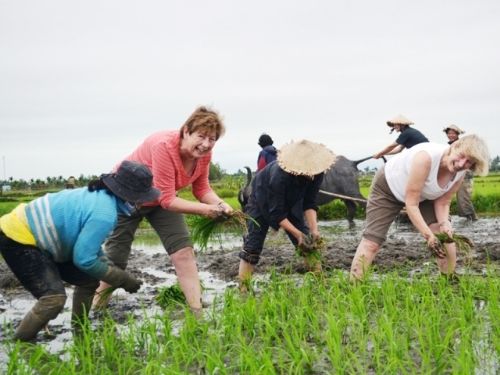Agricultural tourism is a longstanding tourism form quite successful in some countries in the world. In Vietnam, this type has just begun to be tapped and its scale is still small.

Great potential for development
According to statistics, as of early 2016, Vietnam had 23 million people working in agriculture. Each region has its own characteristics that create local cultural identity which is very attractive to visitors. Currently, agritourism is mainly developed by households. Tourists will be able to experience countryside living and working environment and daily activities such as catching, gathering, cooking and enjoying. Those joining agritourism not only enjoy a fresh air and escape from the noisy bustle of city life, but also explore different ways of farming such as growing and picking wild vegetables in forests, medicinal herbs and honey, picking and drying tea, milking cows or catching fish.
Besides, with cultural diversity and local enthusiastic and hospitable people, visitors can exchange, sing, dance and join festivals with local people to enjoy an extremely cosy atmosphere.
Without some of the specific expectations that often come with luxury holidays or adventure tourism, agricultural tourism brings a sense of tranquillity and leisure. Therefore, agricultural tourism is growing stronger alongside other types of tourism like vacation, adventure and village tour.
Mr Pham Tien Dung, Secretary General of Unesco Vietnam Travel Club, CEO of GoldenTour said, “Vietnam has a great agricultural foundation. Farmers live in every locality with wet-rice civilisation and agricultural tradition. Each locality has different forms of agriculture and techniques. Therefore, they altogether create unique agricultural cultures. Besides, farmers are friendly and hospitable enough to attract tourists from near and far.
According to the Ho Chi Minh City Tourism Department, agritourism demands increase 20 - 30 per cent annually. Smart agritourism products draw the attention of tourists, for example tours to Ho Chi Minh City Agricultural Hi-tech Park based in Cu Chi district. Visitor arrivals to the park increased from 7,000 in the first year to 12,000 in 2016, and are expected to reach 15,000 in 2017.
Large-scale and well-prepared
Dr Tran Van Khoi, Acting Director of the National Agricultural Extension Centre, said, “The combination of sustainable agricultural production and ecological tourism has created ground-breaking innovations to enhance production performance, increase income for farmers and contribute to sustainable agricultural development.”
Therefore, many countries have tapped this tourism type and achieved very good results. In Vietnam, this is a relatively new tourism type provided by small business units. To develop agricultural tourism, there is a need for joint cooperation among authorities, tour operators, farm owners and local people.
Agricultural tourism is directly engaged by local people. They manage, provide and guide services and they are the biggest beneficiaries in the field. Thus, besides farming skills, local people also need to be trained in tourism service skills.
In addition, businesses and local authorities need to be creative and develop more tourist products that are distinctive and innovative. Vietnam has a great agricultural advantage plus local identity to develop a wide range of tourism products to meet all tourists’ demands of discovery and experience.
To develop agritourism and make a breakthrough growth in the coming time, it is necessary to ensure equity for all stakeholders, benefit local people, preserve heritages and protect the environment. In particular, Vietnam should integrate agricultural tourism with handicraft village tourism and ecological tourism. Farms and localities should coordinate with each other enrich products and attract tourists.
At the same time, it is essential to boost the cooperation between farm owners and tour operators in order to develop rational tour programmes and introduce agritourism products to domestic and foreign tourists.
Last but not least, as agricultural tourism is quite new in Vietnam, it is urgently important to perfect management policies, support policies and operating mechanisms to provide favourable conditions for unlocking potential and preserving traditional heritages.
